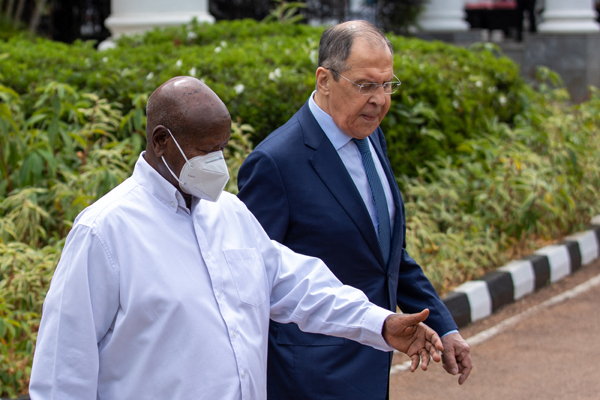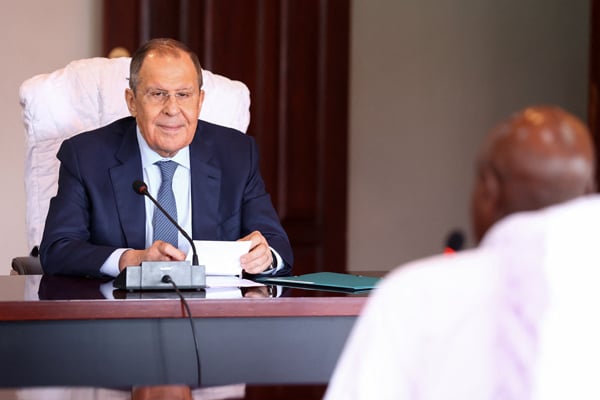Prime
Tough choices for Kampala as USA, Russia trade blows

Ugandan President Museveni (left) walks with Russian Foreign Minister Sergei Lavrov at State House in Entebbe, Uganda, on July 26. PHOTO | AFP
What you need to know:
- In a media note, the United States Mission to the United Nations revealed that Ambassador Linda Thomas-Greenfield will “discuss the US and global response to the impact of Russia’s war against Ukraine on global food security, as well as other regional and bilateral priorities.”
Barely days after hosting Russia’s top diplomat, Foreign Minister Sergei Lavrov, Uganda will next week brace itself for a visit from the United States Ambassador to the United Nations.
In a media note, the United States Mission to the United Nations revealed that Ambassador Linda Thomas-Greenfield will “discuss the US and global response to the impact of Russia’s war against Ukraine on global food security, as well as other regional and bilateral priorities.”
Ms Thomas-Greenfield will also continue discussions with government and civil society leaders [in Uganda] about the importance of strong and inclusive democratic institutions, respect for human rights, and the promotion of peace, stability, and economic growth.
The 69-year-old career diplomat “will also discuss bilateral and regional security issues, and Uganda’s commitment to welcoming and supporting refugees.”
Experts believe discussions with Ambassador Thomas-Greenfield and President Museveni will be slightly awkward after the latter rolled out the proverbial red carpet for a top official from a country the US has repeatedly sanctioned.
During a media briefing this past week—after discussing issues of “mutual interest” with Mr Lavrov behind closed doors—Mr Museveni said “rivalry” between the US and Russia “is not part of our liberation strategy.”
Russia has become persona non grata in the global north after it invaded Ukraine at the backend of February. The war enters its 158th day and counting today.
“We don’t believe in making enemies of other people’s enemies,” Mr Museveni said this past week before rolling off a number of areas of cooperation Uganda has with Russia.
Military cooperation
Recently, the military cooperation between the two countries has become more pronounced. In 2010, the Russian newspaper Vedomosti revealed how Kampala had placed an order with Rosoboronexport—a state-owned arms exporter—for six fighter jets of the Su-30 MK2 type.
Without disclosing how much the consignment would cost Uganda, the newspaper said Russia would require Kampala to pay for the jets much later when proceeds from Uganda’s oil fields in the Albertine Graben start flowing.
Mr Museveni later put the cost of the fighter jets at Shs1.7 trillion
Recently, in June, Defenceweb—a South African-based website that lays claim to being a trusted online source of news on aerospace, defence and security matters—revealed how Uganda had shelled out $18m (Shs69 billion) to add Russia’s Mi-28 combat helicopter to UPDF’s stockpile.
Mr Museveni also interfaced on Zoom with Mr Dmitry Medvedev—the former Russian President, who is now the chairman of the United Russian Party. Uganda’s head of state later revealed that the pivot towards Moscow was “because they had an anti-colonial position.” The pivot, however, came after Washington opted not to include Uganda among 110 countries that took part in the Summit for Democracy.
The US Department of State said the aim of the summit that took place last December was to bring together leaders from government, civil society, and the private sector to “set forth an affirmative action agenda for democratic renewal and to tackle the greatest threats faced by democracies today through collective action.”
Uganda is a recipient of significant development and security assistance from the US. In 2014, a US congressional committee received a letter from the US Department of Defence, which indicated that Uganda was eligible to receive military backing worth $12.6m (about Shs48.5 billion) for what they termed as “counterterrorism programmes.”
US snub?
In 2021, the State Department indicated on its website that it gives Uganda $970m (about Shs3.7 trillion) per annum in development and security aid. Yet it received no invite to a summit that attracted neighbours Kenya and the Democratic Republic of the Congo. Other African countries that were invited included Angola, Namibia, Malawi, Nigeria, Senegal, and South Africa. The snub is reported to have stung Mr Museveni.
“The Western world, especially in the post-Soviet Union era, especially the Democratic Party of the USA and mainly Scandinavian countries, have got a value-based foreign policy as opposed to interest-based foreign policy,” Mr Mwambustya Ndebesa, a political-historian from Makerere University, said, adding: “Most authoritarian countries in Africa are fearful of value-based diplomacy because they don’t want to be pressurised to be politically accountable. Russia and China don’t care about values, democracy, and the dignity of man. Mainly for them, they pursue economic interests.”
Russian fightback
During his visit to Uganda this past week, Mr Lavrov went to great lengths to show that the US misrepresents Russia to curtail Moscow’s growing global influence.
“Actually, this started a long time ago before the military operation in Ukraine. Remember in 2016, when they said it is Russia which elected [former US] President Trump,” Russia’s top diplomat said.
The US recently came up with the Countering Malign Russian Activities in Africa Act, which awaits President Biden’s signature. The Act was crafted after 17 countries—Uganda inclusive—registered as abstentions in the February 27 resolution that condemned Russia’s invasion of Ukraine.
The Act sets out to “regularly assess the scale and scope of the Russian Federation’s influence and activities in Africa that undermine United States objectives and interests, and determine how to address and counter such influence and activities effectively, including through appropriate United States foreign assistance programmes; and to hold accountable the Russian Federation and African governments and their officials who are complicit in aiding such malign influence and activities.”
Back in February, Kampala said it chose to abstain during the vote because it neither aligns with the West or East. Mr Museveni reiterated the position this past week. Mr Ndebesa reckons recent developments change the outlook.
It remains to be seen what implications such a change of outlook will have. For now, though, Kampala is readying itself for Ambassador Thomas-Greenfield’s forthcoming visit.





